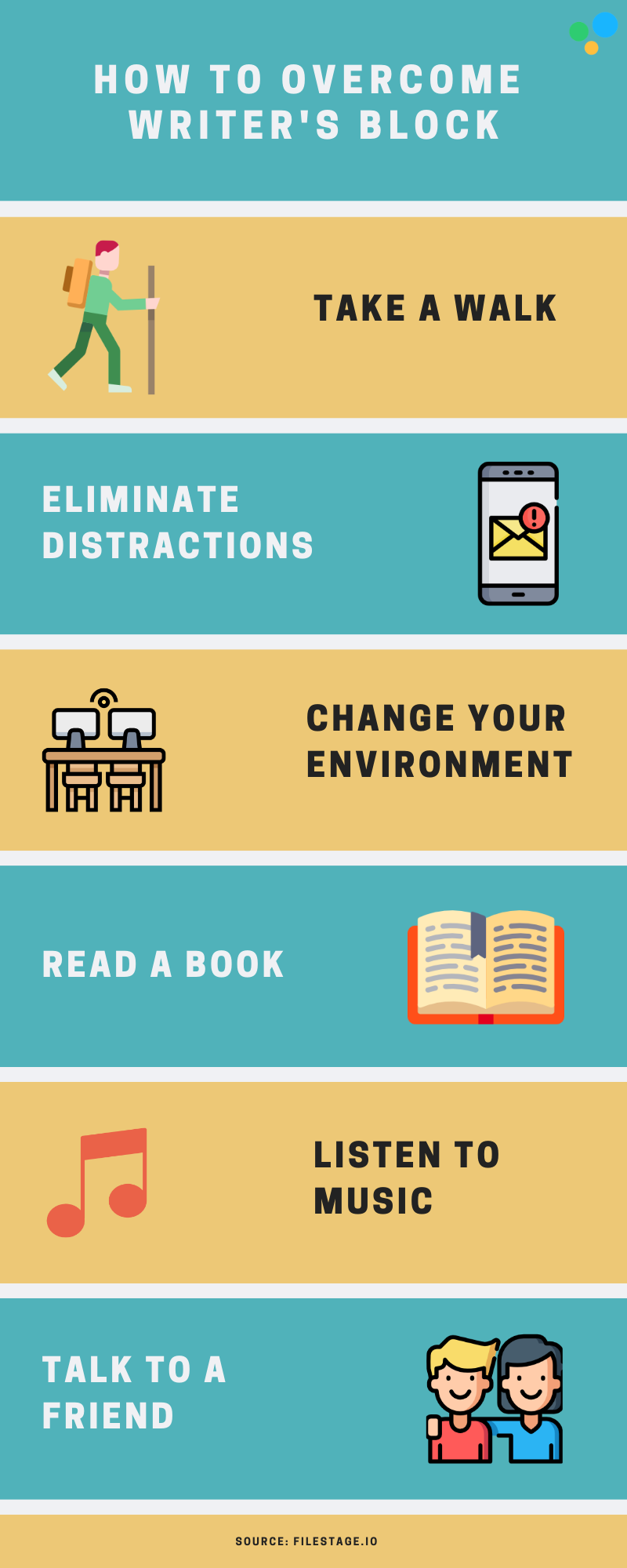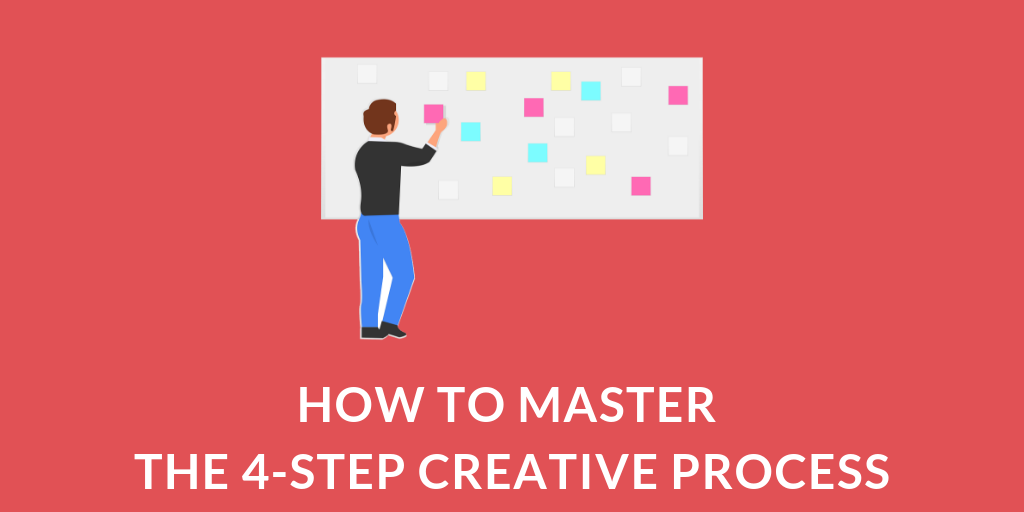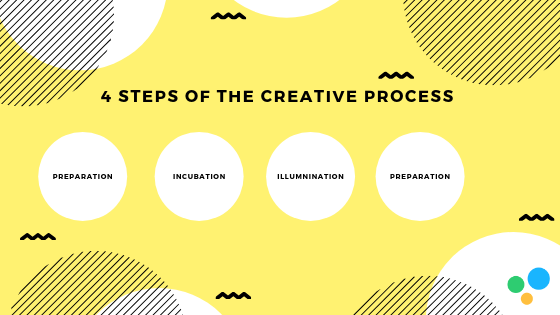Creativity is so important in this day and age. It can be the mother of invention, offer solutions to any number of problems and work as the incentive to produce works of art that can include paintings, songs, books, pieces of music….and the list goes on.
If you work in an ad agency, being creative is part of the job. But being creative doesn’t come as easily to some as it does for others and it can be especially difficult to be creative if it is part of your everyday routine. Understanding the creative process can help you better understand what it takes to get your mind brainstorming out of the box solutions making it easier for you to churn out great ideas every on a regular basis.
The 4 Creative Process Steps
Although the process of creativity can work in various ways for different people, generally, these are the basic steps:
1. Preparation
The creative process starts with preparation or creative brief (download perfect template here). This can be a learning process, or a review of what you are already familiar with and pertain to the project you are working on.
For instance, a musician who is looking to write a song or instrumental line might get prepared to create by working on scales he or she already knows or exploring ones that are new to them. A painter might mess around with paint or visit an art gallery.
Though the steps taken in preparation might seem a bit mundane and tedious, they can really work to get the creative process off to a great start.
2. Incubation
The incubation process usually works on a subconscious level. Once the preparation has been done, creative forces start to work in your mind that can lead to the creation of a great piece.
The incubation of these ideas may begin to form in dreams and vague thought processes but are often blocked out by the stresses of everyday life.
3. Illumination
This is your aha moment. This is the stage where your dreams become a reality, in a quite literal sense. Suddenly, you see clearly what the subject of your next painting should be, how the next act in your book should play out or maybe that hit song just randomly begins playing in your mind.
The unfortunate thing about illumination is that it often hits at the most inconvenient times. You might be in the middle of an important business meeting, not have access to any writing material or even be in the shower when you are suddenly struck by that winning idea. Do what you can to avoid this from happening by keeping paper and pens easily accessible at all times.
4. Implementation
This is the stage where your idea actually sees the light of day. For a songwriter, this might be working the piece out on paper and playing it on your instrument. For a painter, this could be the process of actually putting the painting on a piece of canvas.
The Creative Process at an Ad Agency
If you work in creative at an ad agency, the creative process may be a bit different for you than it is for other creative minds.
For preparation, you might begin by familiarizing yourself with your client’s business, product or services. You may then review other ads that were created in the desired mediums for companies in the same industry.
Once the incubation and illumination stages have occurred, you will want to jot down whatever ideas you have onto a piece of paper, Word document, spreadsheet or whatever the desired format of your office may be. This will be a part of the implementation process.
Not every idea you have will be a winner, but it is a good idea to bring in as many ideas as possible as it may inspire others in the office to create something worthwhile such an amazing advertising pitch.
Once you bring your ideas in, the creative process begins again to some extent as ideas are reviewed. Ones that may not work are discarded while others are kept and worked on to see how they can be implemented and improved upon.
Dealing with Writer’s Block
Of course, not everyone can be creative on cue, and this can be especially frustrating if you’re working at an ad agency or any other job that requires you to have creative ideas on a regular basis. For those who are employed in the creative field, the term writer’s block can be a curse that not many want to even speak of!

There are many reasons you may be suffering from writer’s block and understanding the source may help you overcome whatever’s getting in the way of your creativity. Here are some reasons you may find yourself struggling to create:
Timing
You may not have given your ideas enough time to incubate. If this is the case, give your ideas more time to stew, if possible.
Fear
Many creative people are simply afraid to put their ideas down on paper because they are not sure what other people might think of them. If you are hoping to get a job at an ad agency, you better be able to overcome this fear pretty quickly!
Perfectionism
As mentioned before, not all of your ideas will be winners, but if you’re working at an ad agency, bringing in a lot of ideas during the early stages of ad creation is recommended as you never know where they may lead. But whether you are working in an ad agency or not, you should never be afraid of getting ideas out that you may consider substandard. You can always use pieces of your creation to make something you are really happy with in the future.
How to Overcome Writer’s Block
No matter what the cause of your writer’s block may be, there are certain things you can do to overcome it. Follow these steps so you can work with the creative process to come up with new ideas.
Gather New Material
It is a good idea to start the creative process by reviewing things you already know but adding something new to the mix can really get those creative juices flowing. Musicians might try working with new scales or instruments and exploring different genres. A painter might work with different types of paint and surfaces.
Take some time to work with these new materials without pressuring yourself to create. Just concentrate on familiarizing yourself with your new tools and getting them under your fingers and into your mind.
Step Away
If you become too focused on the task of creating, you will begin getting frustrated. Once you have familiarized yourself with your new materials, now is the time to let them grow.
Return
Of course, if you completely abandon your creative process, you can’t expect ideas to just come to you. This does happen occasionally, and when it does it can be a beautiful thing. But at some point, you will have to return to actively participating in the creative process to see what ideas may have developed.
Hopefully, your time away will allow you to return to your project refreshed and ready to come up with some new, great ideas.
Here are some other ways to overcome writer’s block:
- Take a walk
- Eliminate distractions
- Change your environment
- Read a book
- Listen to music
- Talk to a friend
- Browse the internet
- Do other productive things

Where Creativity Goes Wrong
If you’re not getting winning creative ideas, it can also be due to how you are handling the stages of the creative process.
Usually, people mess up their creative process in the first two steps.
Taking a look at the preparation process, when people start choosing things to focus on, they may not choose things that motivate or interest them. For those of us that already know the path we would like to pursue, this may not be an issue, but for those who are just trying to find our creative voice, this can be a major concern. If you haven’t found a creative outlet that interests you, it is easy to get discouraged and give up, thinking your pursuits are a waste of time.
Some think the creative process is one that requires isolation. They don’t realize how social the creative process can be.
While many ideas can come to you when you’re sitting alone and thinking, they can also come from talking to other people with similar interests to yours. This type of socializing can be especially useful in the incubation stage when ideas are just beginning to come together.
Working for others can also affect your ability to create. Read on to find out how this situation can get in the way of the creative process and what you can do to deal with it.
To better understand how working for others can be frustrating for some creatives, let’s look at the following scenario (one that is a common occurrence at an ad agency).
Say you are working on developing ideas for a client and suddenly your boss announces that he wants the department to change direction. Creatives may become frustrated with this situation because it has a tendency to stunt the incubation process. However, a true pro will understand that their employment is contingent on their ability to leverage their creativity, and they’ll be able to roll with the punches.
Why Originality May be Overrated
The creative process can also become frustrating when you are dismissing the ideas you are coming up with because you think they are unoriginal. This may be better explored when considering the much-asked question, is any idea an original idea? Though this question might seem a bit rhetorical, let’s look at some historical greats to get a better grasp on the issue of originality.
Looking back through history, we see a number of artists that borrowed from their contemporaries. Shakespeare was noted for mimicking Christopher Marlowe. Bob Dillon admitted to rearranging blues ballads and adding original lines here and there and The Beatles were known for the imitation of the many blues, R&B and rock n’ roll bands that came before them.
The secret behind the success of these great artists is that, as they were imitating, they were also finding their own voices. They borrowed from what they knew and loved combined ideas, and eventually came out with works that would give them their identities and establish them as innovative artists.
Of course, this doesn’t mean that artists should just copy from what has come before them. After all, society will always want something new as opposed to hearing what they’ve heard time and time again. But the trick is, to keep using what you know and integrating something new until you have found your original voice.
Are Creativity and Intelligence Related?
Despite what most may believe, research has shown that there is a loose connection between creativity and intelligence. There are many people that are creative without having high intelligence levels while some intelligent people just aren’t very creative.
However, an intelligent person will be able to prepare more quickly and broadly in the early stages of the creative process. They will also be able to secure employment that allows for more creativity, whether it be within their schedule or within the job description itself.
Of course, a college degree has little to do with creativity or intelligence as there are plenty of intelligent creative people who never went to college.
Conclusion
Creativity is such an important part of life. It can shape your career, provide solutions for a number of problems or just serve as a healthy outlet for many people. Understanding the creative process can help you to better connect with your creativity, giving you the tools you need to move forward in life. Hopefully, this article has given you some valuable insight into the creative process, so you can take advantage of all that may be going on in that beautiful mind of yours.


